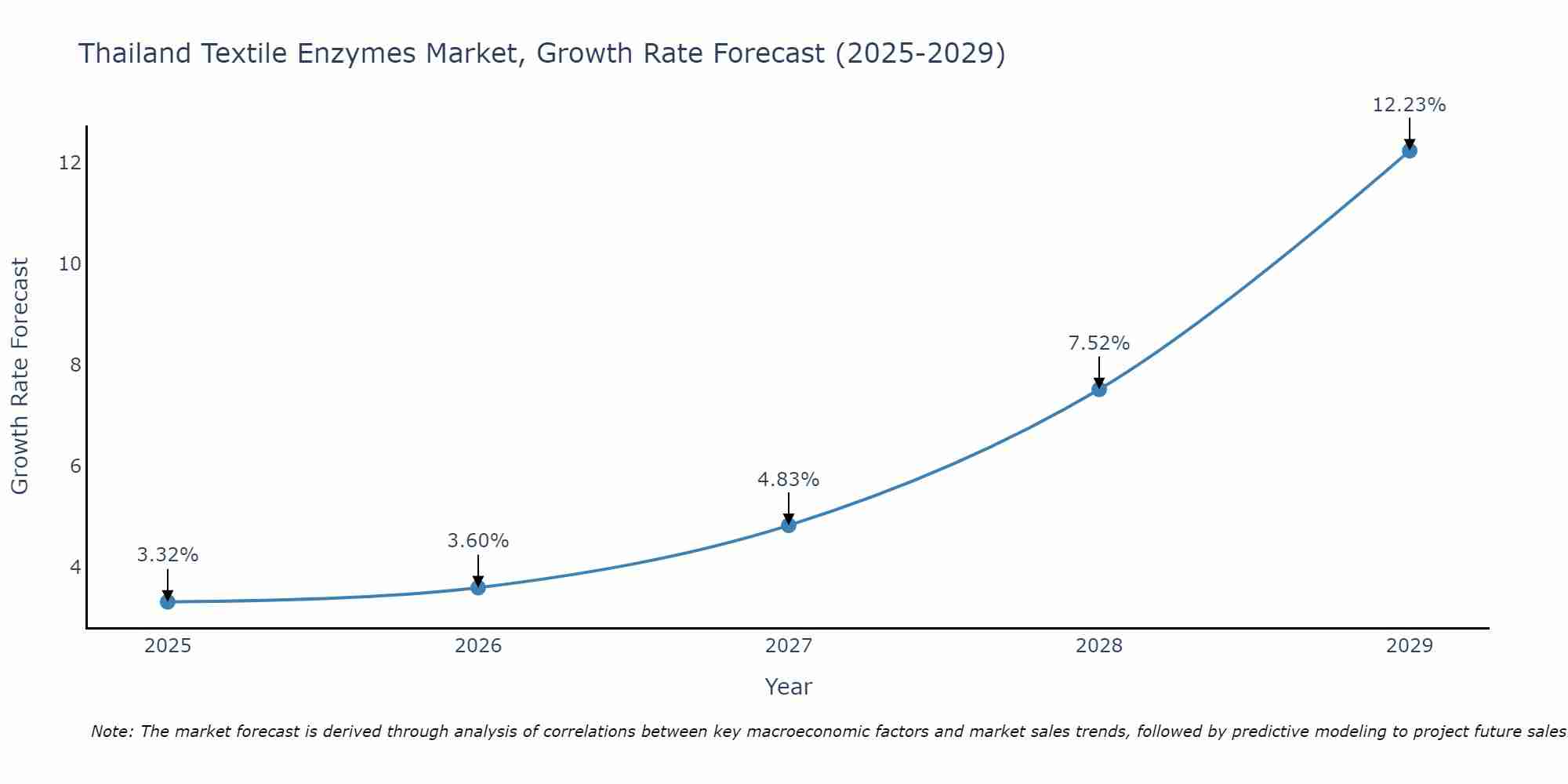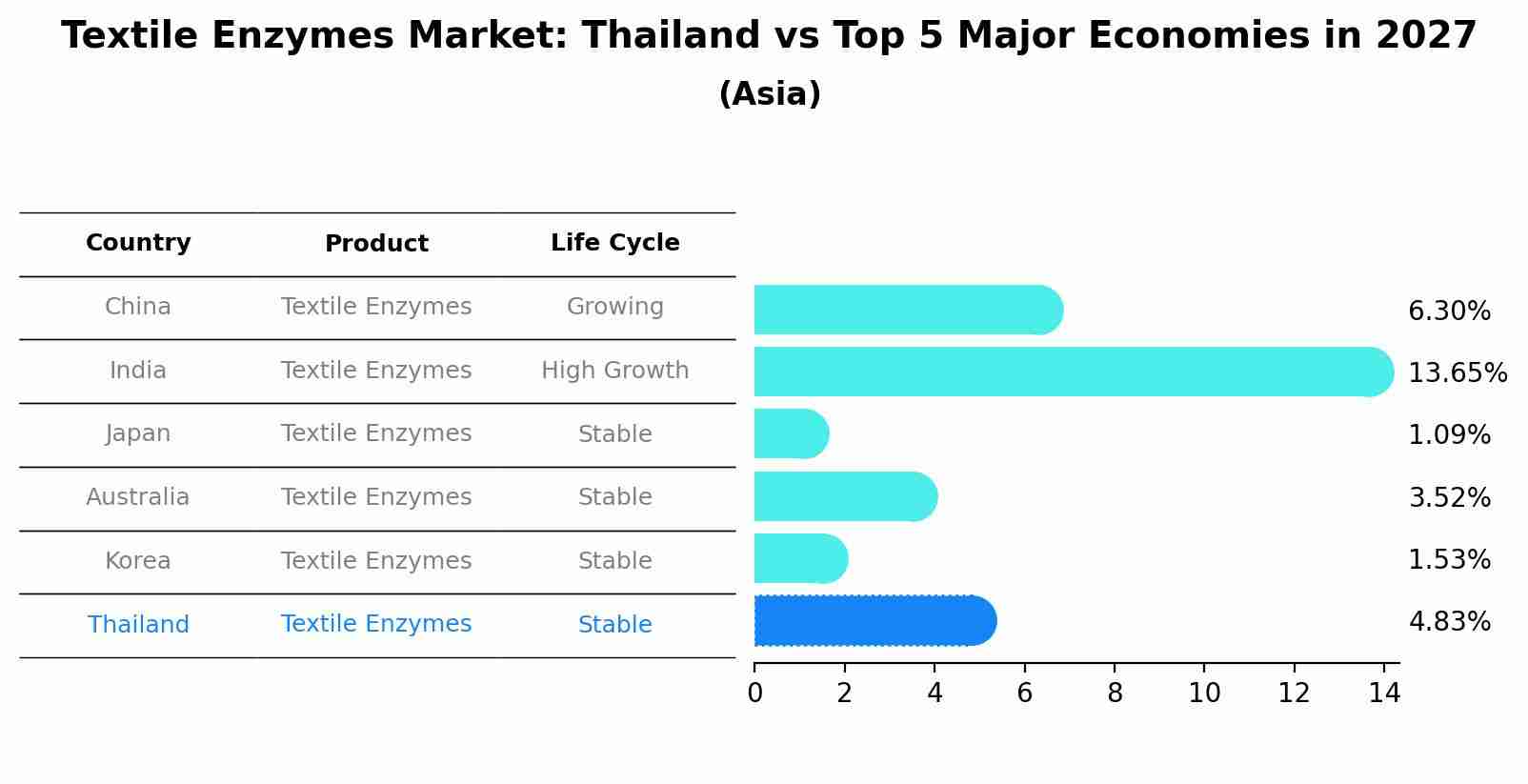Thailand Textile Enzymes Market (2025-2031) Outlook | Revenue, Value, Share, Growth, Forecast, Industry, Companies, Size, Trends & Analysis
| Product Code: ETC094064 | Publication Date: Jun 2021 | Updated Date: Apr 2025 | Product Type: Report | |
| Publisher: 6Wresearch | Author: Ravi Bhandari | No. of Pages: 70 | No. of Figures: 35 | No. of Tables: 5 |
Thailand Textile Enzymes Market Size Growth Rate
The Thailand Textile Enzymes Market is likely to experience consistent growth rate gains over the period 2025 to 2029. From 3.32% in 2025, the growth rate steadily ascends to 12.23% in 2029.

Textile Enzymes Market: Thailand vs Top 5 Major Economies in 2027 (Asia)
Thailand's Textile Enzymes market is anticipated to experience a stable growth rate of 4.83% by 2027, reflecting trends observed in the largest economy China, followed by India, Japan, Australia and South Korea.

Thailand Textile Enzymes Market Synopsis
The textile enzymes market size in Thailand was valued at around USD 98 million in 2025 and is projected to register a CAGR of 3.7% durimg the forecast period owing to rising consumer awareness regarding eco-friendly fashion apparel?s along with government initiatives promoting sustainable production practices within textile industries.Textile enzymes are used by manufacturers for fabric softening or bleaching purposes while eliminating manual labor costs involved in traditional dyeing processes leading them towards more efficient operations, hence driving their adoption across industry. In addition, increasing focus on enhancing product durability while reducing energy consumption have augmented the use of these products especially within synthetic fibers manufacturing process where they act as effective catalysts. Moreover, expansion of online retail channels coupled with growing ecommerce sales has positively impacted overall revenue generation.
Drivers of the Market
The Thailand textile enzymes market is driven by the growing demand for sustainable and eco-friendly textile processing solutions. Textile enzymes are used to achieve various effects in fabric production, such as bio-polishing, stone washing, and color fading. With increasing awareness of environmental concerns and the shift toward greener practices in the textile industry, the demand for textile enzymes is on the rise, contributing to market growth.
Challenges of the Market
Challenges in the Thailand textile enzymes market include regulatory compliance and environmental impact. Enzymes used in textile processing should meet safety and environmental standards. Additionally, manufacturers must ensure that enzyme treatments do not compromise fabric quality or lead to undesirable effects. Finding the right balance between achieving desired results, meeting regulations, and minimizing environmental impact poses a complex challenge in this market.
COVID-19 Impact on the Market
The Covid-19 pandemic had notable effects on the Thailand textile enzymes market. The temporary shutdown of textile and garment manufacturing units and the decreased consumer spending on fashion and apparel products led to a slowdown in demand for textile enzymes used in fabric treatments. As the global textile industry adapts to changing consumer preferences and sustainability considerations, the market is likely to witness recovery driven by the demand for eco-friendly and innovative textile solutions.
Key Players in the Market
In the Thailand textile enzymes market, leading players include EnzymeTech Solutions, ThaiTextile Enzymes Ltd., and BioFabric Innovations. These companies provide textile enzymes used in processes like desizing, bio-polishing, and denim fading. Their contributions to sustainable and eco-friendly textile finishing establish them as key players in the industry.
Key Highlights of the Report:
- Thailand Textile Enzymes Market Outlook
- Market Size of Thailand Textile Enzymes Market, 2024
- Forecast of Thailand Textile Enzymes Market, 2031
- Historical Data and Forecast of Thailand Textile Enzymes Revenues & Volume for the Period 2021-2031
- Thailand Textile Enzymes Market Trend Evolution
- Thailand Textile Enzymes Market Drivers and Challenges
- Thailand Textile Enzymes Price Trends
- Thailand Textile Enzymes Porter's Five Forces
- Thailand Textile Enzymes Industry Life Cycle
- Historical Data and Forecast of Thailand Textile Enzymes Market Revenues & Volume By Type for the Period 2021-2031
- Historical Data and Forecast of Thailand Textile Enzymes Market Revenues & Volume By Cellulase for the Period 2021-2031
- Historical Data and Forecast of Thailand Textile Enzymes Market Revenues & Volume By Amylase for the Period 2021-2031
- Historical Data and Forecast of Thailand Textile Enzymes Market Revenues & Volume By Catalase for the Period 2021-2031
- Historical Data and Forecast of Thailand Textile Enzymes Market Revenues & Volume By Pectinase for the Period 2021-2031
- Historical Data and Forecast of Thailand Textile Enzymes Market Revenues & Volume By Laccase for the Period 2021-2031
- Historical Data and Forecast of Thailand Textile Enzymes Market Revenues & Volume By Others for the Period 2021-2031
- Historical Data and Forecast of Thailand Textile Enzymes Market Revenues & Volume By Application for the Period 2021-2031
- Historical Data and Forecast of Thailand Textile Enzymes Market Revenues & Volume By Bio-polishing for the Period 2021-2031
- Historical Data and Forecast of Thailand Textile Enzymes Market Revenues & Volume By Desizing for the Period 2021-2031
- Historical Data and Forecast of Thailand Textile Enzymes Market Revenues & Volume By Enzymatic Bleaching for the Period 2021-2031
- Historical Data and Forecast of Thailand Textile Enzymes Market Revenues & Volume By Bioscouring for the Period 2021-2031
- Historical Data and Forecast of Thailand Textile Enzymes Market Revenues & Volume By Others for the Period 2021-2031
- Thailand Textile Enzymes Import Export Trade Statistics
- Market Opportunity Assessment By Type
- Market Opportunity Assessment By Application
- Thailand Textile Enzymes Top Companies Market Share
- Thailand Textile Enzymes Competitive Benchmarking By Technical and Operational Parameters
- Thailand Textile Enzymes Company Profiles
- Thailand Textile Enzymes Key Strategic Recommendations
Frequently Asked Questions About the Market Study (FAQs):
- Single User License$ 1,995
- Department License$ 2,400
- Site License$ 3,120
- Global License$ 3,795
Search
Thought Leadership and Analyst Meet
Our Clients
Related Reports
- Afghanistan Apparel Market (2026-2032) | Growth, Outlook, Industry, Segmentation, Forecast, Size, Companies, Trends, Value, Share, Analysis & Revenue
- Canada Oil and Gas Market (2026-2032) | Share, Segmentation, Value, Industry, Trends, Forecast, Analysis, Size & Revenue, Growth, Competitive Landscape, Outlook, Companies
- Germany Breakfast Food Market (2026-2032) | Industry, Share, Growth, Size, Companies, Value, Analysis, Revenue, Trends, Forecast & Outlook
- Australia Briquette Market (2025-2031) | Growth, Size, Revenue, Forecast, Analysis, Trends, Value, Share, Industry & Companies
- Vietnam System Integrator Market (2025-2031) | Size, Companies, Analysis, Industry, Value, Forecast, Growth, Trends, Revenue & Share
- ASEAN and Thailand Brain Health Supplements Market (2025-2031) | Strategy, Consumer Insights, Analysis, Investment Trends, Opportunities, Growth, Size, Share, Industry, Revenue, Segments, Value, Segmentation, Supply, Forecast, Restraints, Outlook, Competition, Drivers, Trends, Demand, Pricing Analysis, Competitive, Strategic Insights, Companies, Challenges
- ASEAN Bearings Market (2025-2031) | Strategy, Consumer Insights, Analysis, Investment Trends, Opportunities, Growth, Size, Share, Industry, Revenue, Segments, Value, Segmentation, Supply, Forecast, Restraints, Outlook, Competition, Drivers, Trends, Demand, Pricing Analysis, Competitive, Strategic Insights, Companies, Challenges
- Europe Flooring Market (2025-2031) | Outlook, Share, Industry, Trends, Forecast, Companies, Revenue, Size, Analysis, Growth & Value
- Saudi Arabia Manlift Market (2025-2031) | Outlook, Size, Growth, Trends, Companies, Industry, Revenue, Value, Share, Forecast & Analysis
- Uganda Excavator, Crane, and Wheel Loaders Market (2025-2031) | Strategy, Consumer Insights, Analysis, Investment Trends, Opportunities, Growth, Size, Share, Industry, Revenue, Segments, Value, Segmentation, Supply, Forecast, Restraints, Outlook, Competition, Drivers, Trends, Demand, Pricing Analysis, Competitive, Strategic Insights, Companies, Challenges
Industry Events and Analyst Meet
Whitepaper
- Middle East & Africa Commercial Security Market Click here to view more.
- Middle East & Africa Fire Safety Systems & Equipment Market Click here to view more.
- GCC Drone Market Click here to view more.
- Middle East Lighting Fixture Market Click here to view more.
- GCC Physical & Perimeter Security Market Click here to view more.
6WResearch In News
- Doha a strategic location for EV manufacturing hub: IPA Qatar
- Demand for luxury TVs surging in the GCC, says Samsung
- Empowering Growth: The Thriving Journey of Bangladesh’s Cable Industry
- Demand for luxury TVs surging in the GCC, says Samsung
- Video call with a traditional healer? Once unthinkable, it’s now common in South Africa
- Intelligent Buildings To Smooth GCC’s Path To Net Zero


















